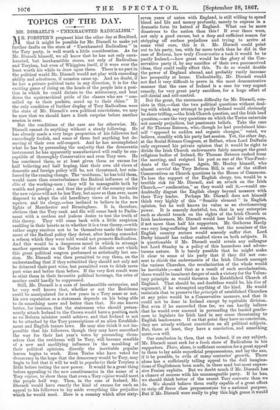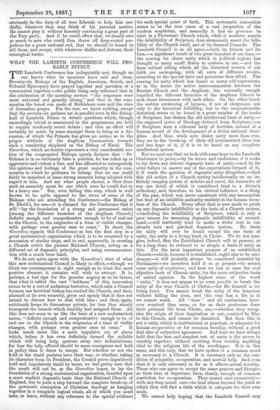mutiny could hardly be suppressed. tary principle as would threaten
the Established Church of Still, Mr. Disraeli is a man of inexhaustible enterprise, and England. That should be, and doubtless would be, his line of he very well knows that, whether or not the Residuum argument, if he attempted anything of the kind. He would could be manipulated for a few years in a Tory sense or not, maintain that to preserve the principle of established Churches, his own reputation as a statesman depends on his being able at any price would be a Conservative measure, and that it to do something more and better than that. No one knows could not be done in Ireland except by equitable division.. better, for instance, that the statesman who should perma- But even if he succeeded thus far, we can hardly believe nently attach Ireland to the Crown would have a position, such that he would ever succeed in persuading the landed gentle- as no Reform minister could achieve, and that Ireland is not men to legislate for Irish land in any sense threatening to. to be attached by the Tory prescriptions of an alien Establish- English landowners. If on that point they have no conviction, .ment and English tenure laws. He may also think it not im- they are utterly without conviction on all political subjects.. possible that his followers, though they may have smoothed But, there at least, they have a conviction, and something the way for their last year's votes by persuading them- more,—a will. selves that the residuum will be Tory, will become sensible Our conclusion is, then, that on Ireland, if on any subject, of a new and modifying influence in the moulding of Mr. Disraeli must seek for a fresh store of Radicalism in his their political opinions, directly the inevitable popular supporters. There, alone, is sufficient occasion for a great appea2 leaven begins to work. Even Tories who have voted for to them to lay aside superficial prepossessions, and lay the axe, -democracy in the hope that the democracy would be Tory, may if it be possible, to evils of many centuries' growth. There begin to feel that it will be well to popularize their Toryism a alone has a sufficiently telling appeal to the dull imagine- little before testing the new power. It would be a great thing tions of Englishmen been made' in these mad but most expres- before appealing to the new constituencies in the name of a sive Fenian exploits. But we doubt much if Mr. Disraeli has. Tory regime, to show them that even a Tory re'gime would meet a chance of success with his unmanageable party. If he has, the people half way. Then, in the ease of Ireland, Mr. we should think better of the recent Tory converts than we Disraeli would have exactly the kind of excuse for such an do. We should believe them really capable of a great effort appeal to his followers to lay aside everything like prejudice to strip off fierce class prepossessions for a national purpose. which he would need. Here is a country which after sixty- But if Mr. Disraeli were really to play this high game it would seven years of union with England, is still willing to spend TOPICS OF THE DAY. blood and life and money profusely, merely to express in a dramatic form its hatred of England. What can be more MR. DISRAELI'S "ITNEXHAUSTED RADICALISM." disastrous to the nation than this f If ever there were, lu R. FORSTER'S pregnant hint the other day at Bradford, not only a good excuse, but a deep and sufficient reason for 1 that it might be possible for Mr. Disraeli to make yet stripping off surface prejudices and trying to arrive at further drafts on the store of "Unexhausted Radicalism " in some vital cure, this is it. Mr. Disraeli could point the Tory party, is well worth a little consideration. As for out to his party, too, with far more truth than he did in the Mr. Disraeli himself, we all know that he has not only unex- case of Reform, how truly Conservative a task it would be to hausted, but inexhaustible stores, not only of Radicalism pacify Ireland,—how great would be the glory of the Con- and Toryism, but even of Whiggism itself, if it were ever the servative party if, by any sacrifice of their own preconceived least worth his while to draw upon them. There is no part in ideas, they could really effect this. To do so would double the political world Mr. Disraeli would not play with exceeding the power of England abroad, and probably vastly increase ability and adroitness, if occasion came up. And no doubt, if her prosperity at home. Undoubtedly, Mr. Disraeli would he has a private political taste in any direction, it is for the not find it very difficult to prove in the most demonstrative exciting game of rising on the heads of the people into a posi- manner that the case of Ireland is a case for very urgent lion in which he could dictate to the aristocracy, and beat remedy, for very great party sacrifices, for a huge effort of down the squirearchical pride of the classes who are " con- self-denial and self-control. soiled up to their pockets, acred up to their chins." If But the great, the enormous difficulty for Mr. Disraeli, con- the only condition of further display of Tory Radicalism were sista in this,—that the two political questions without deal- the state of Mr. Disraeli's own political convictions, we may ing with which any attempt to pacify Ireland would obviously be sure that we should have a fresh surprise before another be sheer trifling,—the Irish Church question, and the Irish land session is over. question,—are the very questions on which the Tories entertain But the conditions of the case are far otherwise. Mr. not merely prejudices, but passionate beliefs. Take the case Disraeli cannot do anything without a steady following. He of Sir Thomas Bateson, whop.though he had proclaimed him- has already made a very large proportion of his followers feel self "opposed to sudden and organic changes," voted, we exceedingly foolish, and some of them feel anything but de- believe, steadily with his party last session. Yet, the other day, serving of their own self-respect. And he has accomplished at the Social Science Congress, at Belfast, when Lord Dufferin what he has by persuading the majority that the democratic only expressed his private opinion that it would be right to instrument he has apparently manufactured will really be sus- divide the Irish Church endowments fairly amongst the great. ceptible of thoroughly Conservative and even Tory uses. He religious bodies of Ireland, Sir Thomas Bateson rushed Irony has convinced them, or at least given them an excuse for the meeting, and resigned his post as one of the Vice-Presi- half believing and half hoping, that their own old views of dents of the Congress. Again, Mr. Henley himself, who domestic and foreign policy will be, not threatened, but rein- almost carried the Tory Reform Bill, is one of the stiffest forced by the coming change. The 'residuum,' he has told them, Conservatives on Church questions in the House of Commons. would more than counterbalance the Radical influence of the To lose the support of the English clergy, too, would be a ate of the working-men ; they will be manageable both by terrible risk for Mr. Disraeli, and an attack on the Irish wealth and prestige ; and thus the policy of the country under Church,—" confiscation," as they would call it,—would un- the new regime will not be less Tory, but more so than ever, more doubtedly disgust the English clergy beyond measure with disposed to adopt the old hereditary views of its lords, its their Tory leader. Perhaps Mr. Disraeli does not himself squires, and its clergy,—less inclined to believe in the new think very highly of this "Semitic element" in English lights of Manchester and Birmingham. It is, therefore, opinion, but he well knows its value as an electioneering obvious that the Tory rank and file will come back to Perla- power. It is scarcely doubtful, too, that in any enterprise ment with a restless and jealous desire to test the truth of such as should trench on the rights of the Irish Church or this theory. They will come back with a little suspicion Irish landowners, Mr. Disraeli would lose half his colleagues, rankling in their hearts as to whether it is a true theory,—with if not more than half his supporters. Mr. Gathorne Hardy rather angry resolves not to be themselves made the instru- was very long-suffering last session, but the nominee of the ment of the Radical policy they detest, after having conceded English country rectors would scarcely suffer that. Lord. a reform which they were told would not promote Radicalism. Derby himself has rather exalted views on both subjects. a And this would be a dangerous mood in which to attempt is questionable if Mr. Disraeli could retain any colleague another operation on the Tories of that delicate sort which but Lord Stanley in a policy of this hazardous and adven- this great political surgeon performed so artistically last ses- turous nature. It is barely possible that he might make sion. Mr. Disraeli was then permitted to cup them, on the it clear to some of his party that if they did not con- understanding that if they submitted they should not only not sent to divide the endowments of the Irish Church amongst be debarred their port wine, but permitted even to drink more the various Churches, the secularization of the whole would port wine and better than before. If the very first result were be inevitable ;—and that as a result of such secularization, to stint them in their favourite political beverage, the cries of there would be imminent danger of such a victory for the Volun- obviously be the duty of all true Liberals to help him cor- .dially, whatever they may think of his personal motive. He cannot play it without honestly convincing a great part of the Tory party. And if he could effect that, we should owe so much to men who could thus throw off deep-rooted pre- judices for a great national end, that we should be bound to aid them, and accept, with whatever dislike and distrust, their strategical leader.































 Previous page
Previous page